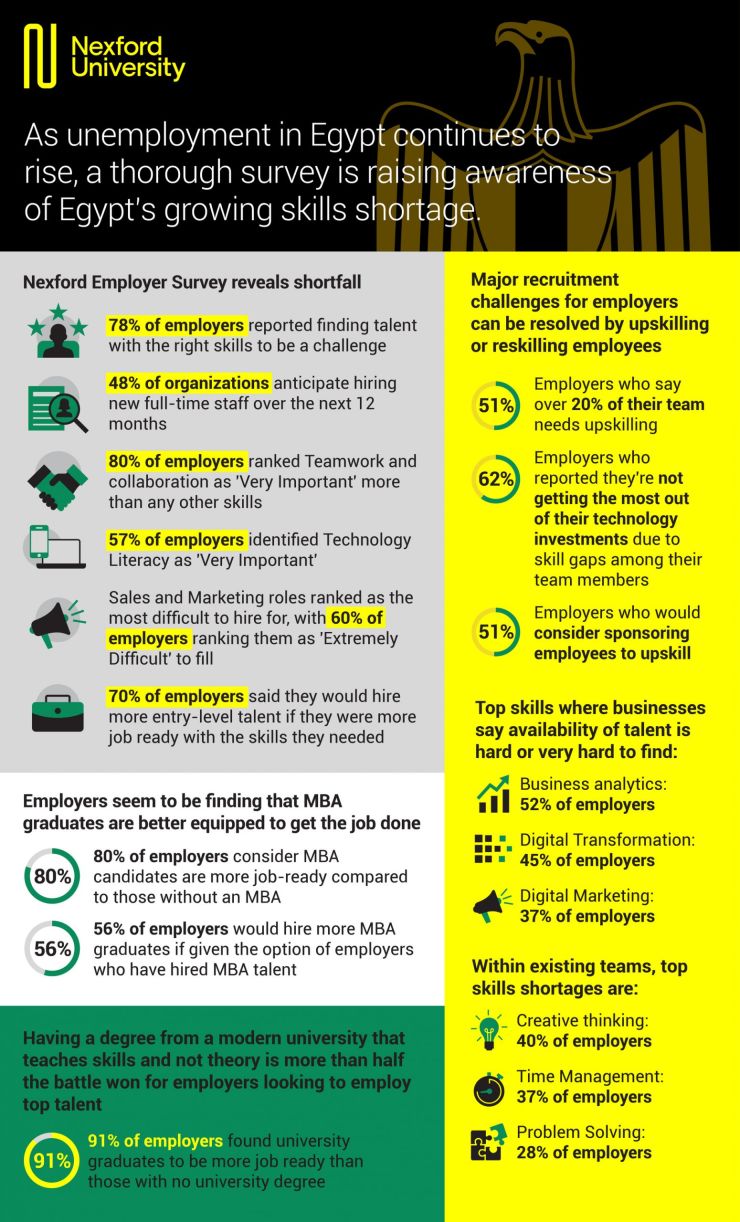
Skills shortages in Egypt leaves companies at a disadvantage
Thanks to an ever-widening gap between skilled and unskilled workers in Egypt, many employers are struggling to hire top talent
Employers are looking for experienced talent now. Having the right skills is vital – but finding them can be a challenge, according to Nexford’s inaugural survey of leading Egyptian employers.
According to official figures released in November 2021, the Q3 figure for unemployed Egyptians reached 2.2 million – 7.5% of the labor force – a quarter-on-quarter increase of 0.7%. The Central Agency for Public Mobility attributes the rise to the new graduate influx in August and September, many of whom are still unemployed.
The advent of the pandemic, and the shock to the world economy, escalated unemployment higher on government agendas. Following initial increases in unemployment and temporary furlough schemes, recent data suggests companies are now desperate to fill vacant positions.
Yet, as unemployment in Egypt continues to rise, Nexford’s survey raises awareness of the country’s growing skills shortage and hiring challenges faced by employers – in line with global trends in most fast-changing, growing economies.
Global skills shortage
A major problem facing the global higher education sector is the relevance of traditional university courses. The huge gap between skills taught by traditional universities, and those sought by global employers, is growing. It is an open secret that many universities value theory over practical skills.
Nexford University’s employer survey asked Egypt’s leading businesses – including PWC, Pfizer, and the National Bank of Egypt – about skill shortages and the hiring problems they present.
The survey reveals Egypt mirrors the rest of the world in recruitment challenges faced by companies. 78% of companies noted they struggled to find talent with the right skills; 41% of which said they find it a “major challenge.”
Nearly half of employers said they want to hire full-time staff in the next 12 months, the majority of which are in sales-related roles. The data also showed that corporate searches are often hindered by the widening skills shortage gap at all levels.
Learn how to develop the most in-demand skills for your future career!
Discover how you can acquire the most in-demand skills with our free report, and open the doors to a successful career.
This growing shortage makes it harder for entry level jobseekers to find work – lacking both experience and skills – plus creating obstacles for employers who struggle to find talent to fill entry level positions.
Sales and Marketing roles ranked as the most complicated to hire for, with 60% of employers ranking them as “extremely difficult” to fill.
Business Analytics skills were in shortest supply among new recruits, with 52% of employers noting they find it “hard” or “very hard” to find talent with this skill. Also lacking were Digital Transformation (45%) and Digital Marketing (37%).

MBAs still in demand
Qualified MBA graduates are also in demand. An MBA can make candidates extremely attractive to employers, with the added upside of higher remuneration. Nexford’s survey revealed 90% of employers consider university candidates to be more job-ready than those without a degree, with 80% considering MBA candidates most job-ready.
MBA candidates are more likely to be offered higher starting salaries. Of employers who have previously hired MBA talent, 54% admitted that MBA candidates receive higher salaries than non-MBA workers.
Nexford University offers undergraduate and MBA programs, plus courses and certificates in business, technology, and management-related fields. Having various qualifications can help jobseekers in Egypt, and globally, become more attractive to employees and contribute to a global talent pool of qualified, experienced, and skilled workers.
Demand for upskilling
Last year, the World Economic Forum predicted over one billion people – a third of the world’s workforce – would need to reskill by 2030.
A natural consequence of rapid technological progress is that skills learned in workers’ formative career years become obsolete faster, and job seekers lack skills required to work in the areas where employers are most in need. With longer professional lives and a 20th century educational system, the gap between the supply and demand of skills in the existing labour market, is stark.
Nexford’s survey findings show over half of Egyptian employers noting that at least 20% of their team needed upskilling. The skill most commonly lacking was Creative Thinking, at 39%. Other skills where supply deficits exist include Time Management (36%), Problem-solving (28%) and Technology Literacy (27%).

The scale of the challenge is significant. A lack of the skills in deficit makes it difficult for employees to advance their careers, and is also detrimental to a company’s bottom line. As the digitalization of business increases rapidly, 62% of employers note their technology investments are falling short due to skill gaps.
Many of the skillsets most in-demand relate to the new work environment shaped by digital transformation, where STEM skills are indispensable to all WEF’s top-ranked 10 jobs of ‘tomorrow’ – from digital fitness to ocean tide engineering.
One strategic option to alleviate the challenge is upskilling. Recently, the business community has focused more on investing in workers’ mid-career training and constructing a culture of education in the workplace. The WEF estimates that the creation of a functional multi-generational workforce could even “raise GDP per capita by almost 19% in three decades.”
According to Nexford’s survey, 51% of employers would consider sponsoring employees to upskill – clear evidence that upskilling challenges are understood, and need urgently addressing.
Learn how to develop the most in-demand skills for your future career!
Discover how you can acquire the most in-demand skills with our free report, and open the doors to a successful career.
How Egypt can tackle the skills gap
Encourage skills development of young people and university graduates to equip them with soft skills demanded by Egypt’s leading employers.
Expand formal education opportunities to align with changing employer demand for skills and prepare graduates for the jobs of the future.
Support employers in addressing evolving skills required to succeed in the modern workplace and promote a culture of education among all generations of employees.
Are you future-proof? Do you believe that you have all of the skills sets to make yourself more marketable for better jobs or secure your current one? The best way to future-proof your career is to learn the new skills that will be in high demand in the next five years. By carefully selecting your professional development, you can prepare for the trends we can already see happening across every industry today and higher education is more often not just the ticket to help you get there.
Ready to get started? Download our brochure or book a call with our Nexford Advisors!

Mark is a college graduate with Honours in Copywriting. He is the Content Marketing Manager at Nexford, creating engaging, thought-provoking, and action-oriented content.
Join our newsletter and be the first to receive news about our programs, events and articles.